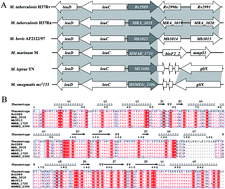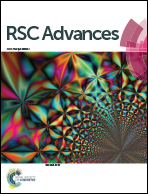Mycobacterial IclR family transcriptional factor Rv2989 is specifically involved in isoniazid tolerance by regulating the expression of catalase encoding gene katG†
Abstract
Transcriptional factors are essential for bacteria to adapt diverse environmental stresses, especially upon exposure to antibiotics. Mycobacterium tuberculosis, the causative agent of tuberculosis which inflicts around one third of the global population, contains three IclR family transcriptional factors, namely Rv1719, Rv1773c and Rv2989. In this study, MSMEG_2386, the homolog of Rv2989 in Mycobacterium smegmatis, was deleted by homologous recombination and complemented. The gene did not affect the growth in conventional culture. However, the growth of deletion mutants upon isoniazid (INH) exposure was severely delayed. This growth defect is specific to INH and not observed in other antibiotics tested, including rifampicin, capreomycin, norfloxacin and ethionamide. The transcription of katG and enzymatic activity of its encoding product catalase were elevated in the MSMEG_2386 deleted M. smegmatis mutants. The survival of MSMEG_2386 deletion mutant within U937 macrophages was markedly reduced compared with the wild type strain. These results improve our understanding of the role of IclR family transcriptional factors in INH resistance in mycobacteria.


 Please wait while we load your content...
Please wait while we load your content...